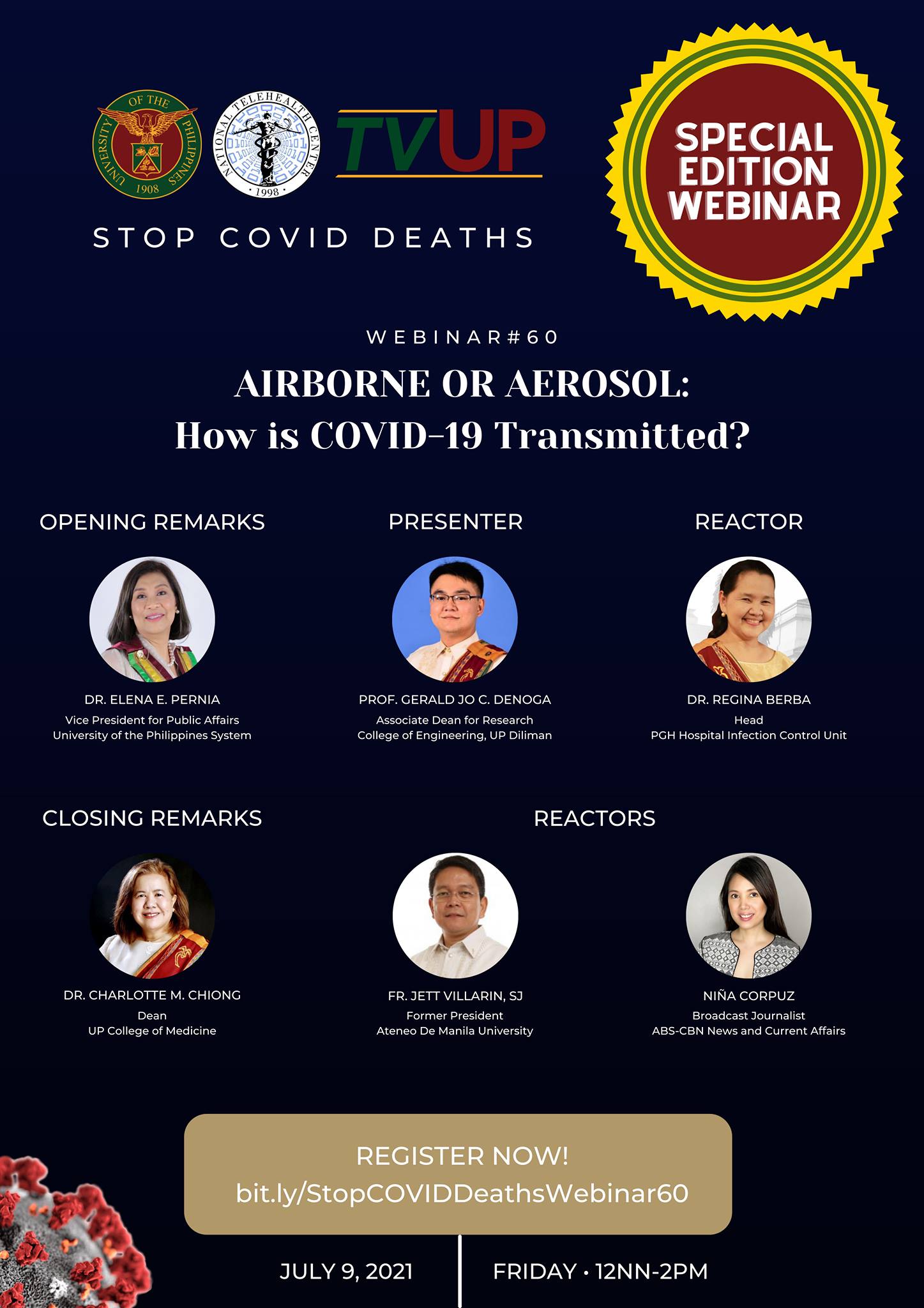
The University of the Philippines in partnership with
UP Manila NIH National Telehealth Center and in cooperation with
UP Philippine General Hospital
would like to invite you to join the Fight Against COVID-19!
Registration slots are limited to this SPECIAL EDITION of
the STOP COVID DEATHS Webinar Series,
so sign up NOW:
bit.ly/StopCOVIDDeathsWebinar60
Webinar #60
“AIRBORNE OR AEROSOL: How is COVID-19 Transmitted?“
July 9, 2021 (Friday) 12nn
Presenter:
Prof. Gerald Jo C. Denoga
Associate Dean for Research, College of Engineering
University of the Philippines Diliman
Reactors:
Dr. Regina P. Berba
Head, PGH Hospital Infection Control Unit
Fr. Jett Villarin, SJ
Former President, Ateneo De Manila University
Niña Corpuz
Broadcast Journalist
ABS-CBN News and Current Affairs
Opening Remarks:
Dr. Elena E. Pernia
Vice President for Public Affairs
University of the Philippines System
Closing Remarks:
Dr. Charlotte M. Chiong
Dean, College of Medicine
University of the Philippines Manila
Webinar #60
July 9, 2021
“AIRBORNE OR AEROSOL: How is COVID-19 Transmitted?”
Special Topic
The debate on the exact mode of transmission of SARSCov2 is typical for new viruses that require close examination. Apart from the fields of biology and medicine, transmission of microbes benefits from the perspectives of engineers who can measure viral particles and recreate how these can move in the air, physicists who study the properties and behavior of particles – as well as infectious disease specialists who can link all this information to human behavior that creates risk for infection.
We know that SARSCov2, the virus that has caused the pandemic, transmitted through droplets. We know that certain hospital procedures can aerosolize the virus and make it airborne – hence hospitals take airborne precautions. The question is, in the community, the workplace, homes and eventually in schools — are there situations where smaller particles can float in the air and still cause infection even after a person who sneezed or coughed has left the room? How long can the virus remain viable (capable of reproducing) in the air or on surfaces? What are the situations that have the highest risks in community transmission? How can we protect ourselves?
Do we need to keep a farther social distance? Completely refrain from eating indoors? How do we properly ventilate our offices, our homes and our schools?
These and many more aspects of the risks of SARSCov2 transmission will be discussed at the STOP COVID DEATHS webinar #60. Main presenter is a mechanical engineer from the UP Diliman College of Engineering, and Associate Dean for Research Prof. Gerald Jo C. Denoga. Reactors are Head of the PGH Hospital Infection Control Unit, Dr. Regina P. Berba; Physicist and former President of Ateneo de Manila University, Fr. Jett Villarin, SJ; and with special participation of veteran health broadcast journalist Niña Corpuz who will make a presentation on how to communicate health risks to the public. Opening Remarks by Vice President for Public Affairs of the University of the Philippines System, Dr. Elena E. Pernia and Closing Remarks by the Dean of the UP College of Medicine, Dr. Charlotte M. Chiong.
Stay Safe. Stay Healthy. Stay Connected!
Together we can STOP COVID DEATHS!








